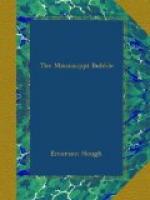“You have quite the advantage of us,” said she. She glanced uneasily at the coachman, but the order to go forward did not quite leave her lips.
“I am not aware—I do not know—,” she began, afraid of her adventure now it had come, after the way of all dreaming maids who prate of men and conquests.
“I should be dull of eye did I not see the Knollys arms,” said the stranger, smiling and bowing low. “And I should be ill advised of the families of England did I not know that the daughter of Knollys, the sister of the Earl of Banbury, is the Lady Catharine, and most charming also. This I might say, though ’tis true I never was in London or in England until now.”
The speech, given with all respectfulness, did not fail of flattery. Again the order to drive on remained unspoken. This speaker, whose foot was now close to the carriage step, and whose head, gravely bowed as he saluted the occupants of the vehicle, presented so striking a type of manly attractiveness, even that first moment cast some spell upon the woman whom he sought to interest. The eyes of the Lady Catharine Knollys did not turn from him. As though it were another person, she heard herself murmur, “And you, sir?”
“I am John Law of Lauriston, Scotland, Madam, and entirely at your service. That is my brother Will, yonder by the bank.” He smiled, and the younger man came forward, hesitatingly, and not with the address of his brother, though yet with the breeding of a gentleman.
The eyes of Mary Connynge took in both men with the same look, but her eyes, as did those of the Lady Catharine, became most concerned with the first speaker.
“My brother and I are on our first journey to London,” continued he, with a gay laugh which did not consort fully with the plight in which he showed. “We started by coach, as gentlemen; and now we come on foot, like laborers or thieves. ’Twas my own fault. Yesterday I must needs quit the Edinboro’ stage. Last night our chaise was stopped, and we were asked to hand our money to a pair of evil fellows who had made prey of us. In short—you see—we fared ill enough. Lost in the dark, we made what shift we could along this road, where we both are strangers. At last, not able to pay for better quarters even had we found them, we lay down to sleep. I have slept far worse. And ’tis a lovely morning. Madam, I thank you for this happy beginning of the day.”
Mary Connynge pointed to the bandage on the younger man’s arm, speaking a low word to her companion.
“True,” said the Lady Catharine, “you are injured, sir; you did not come off whole.”
“Oh, we would hardly suffer the fellows to rob us without making some argument over it,” said the first speaker. “Indeed, I think we are the better off hereabouts for a brace of footpads gone to their account. I made them my duties as we came away. Will, here, was pricked a trifle, but you see we have done very well.”




